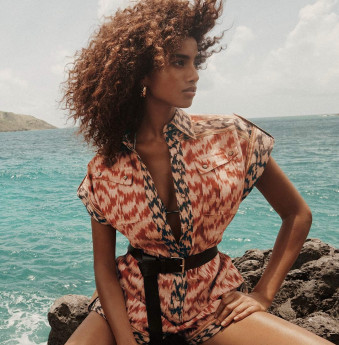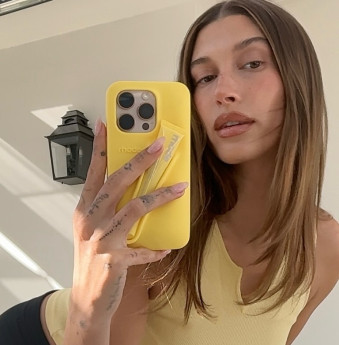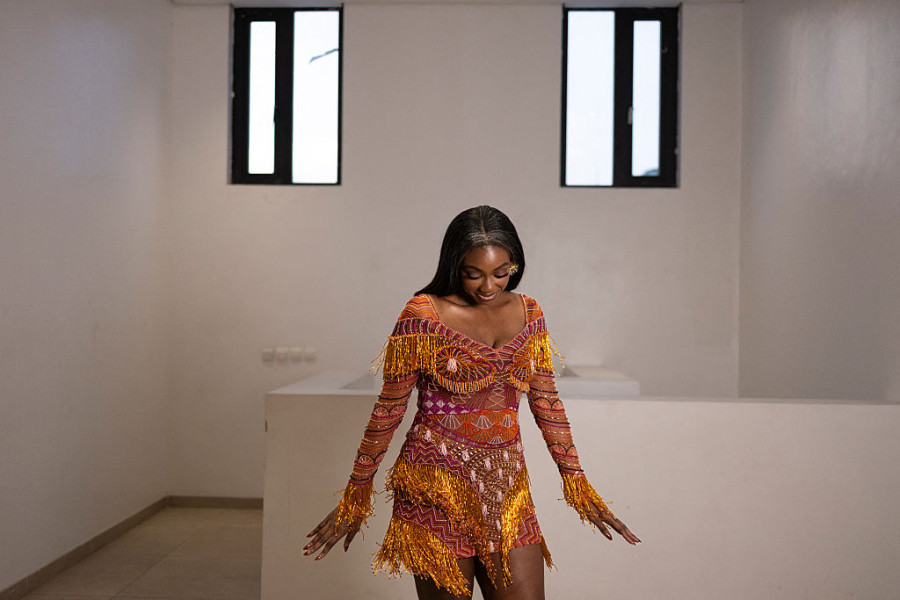
When models strutted down the runway Wednesday night at Lagos Fashion Week, they weren't wearing the kind of muted, "safe" designs that typically dominate high fashion. Instead, they were covered in beads, sequins, vibrant colors, and patterns inspired by traditional Nigerian facial scarification — a practice that has marked rites of passage in some Nigerian communities for centuries.
The designer behind this bold vision? Kanyinsola Onalaja, a British-Nigerian creative who has had an incredible year. After showing her work at New York Fashion Week earlier in 2025, she returned home to Lagos to open Africa's most prestigious fashion event — and she brought the house down.
"Nigeria and its culture and its heritage is 100 percent in my designs, down from inception all the way through to the end," Onalaja told reporters at the show, which she called a "celebration" rather than just a fashion presentation.
And what a celebration it was. Among the guests? None other than singer Ciara, who wore Onalaja's Spring/Summer 2026 designs alongside Nigerian reality star Chi-Chi. The American superstar's presence wasn't just a celebrity cameo — it signaled that African fashion has truly arrived on the global stage.
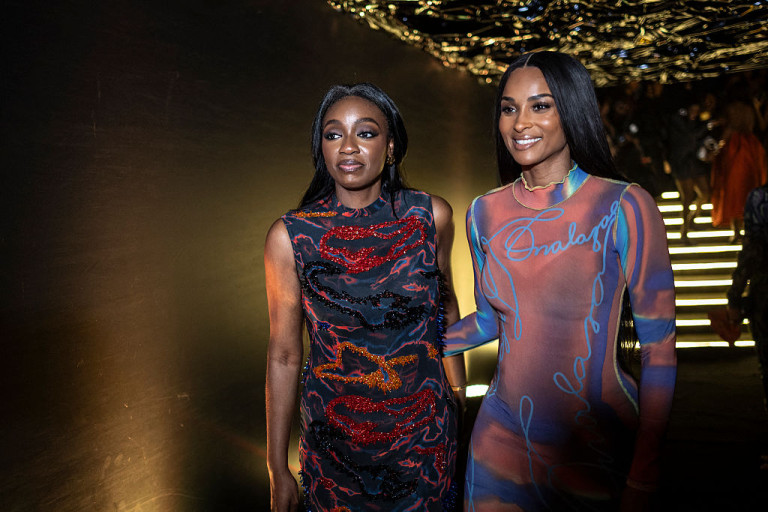
The Designer Who Stopped Playing It Safe
What makes Onalaja's work so compelling isn't just the stunning visual impact — it's the philosophy behind it. In an industry that has historically pressured non-Western designers to tone down their cultural identity, Onalaja has done the exact opposite.
"To be honest, I think I stopped trying to fit into a particular box of what I think the West wants," she explained. "I think I'm just representing myself as how I know and what I've grown up around, which is the colour, sometimes the clashes, the contrast and fusing all of that together."
That approach — embracing "clashes" and "chaos" rather than apologizing for them — has become her signature. And it's working spectacularly well.
Her designs have attracted major Hollywood stars. Jennifer Hudson, Chloe Bailey, and "Real Housewives of Atlanta" star Kandi Burruss have all worn her creations on red carpets, helping introduce Onalaja to American audiences who might never have discovered her otherwise.
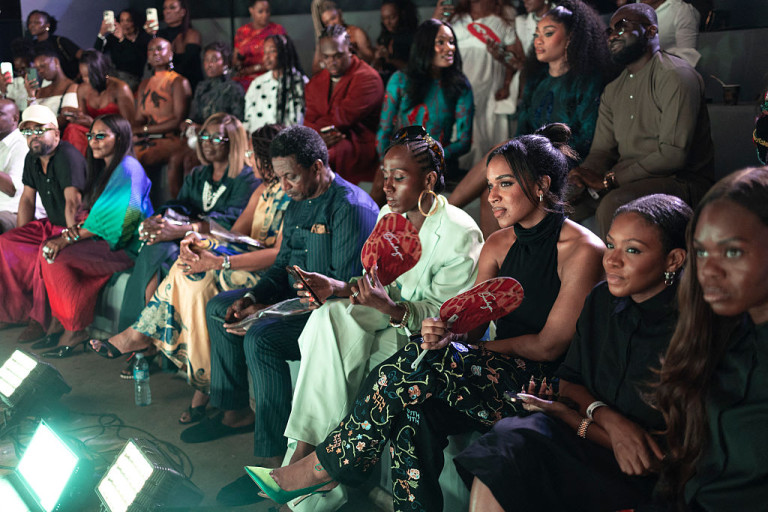
The Personal Mission Behind the Glamour
Beyond the celebrity endorsements and stunning aesthetics, Onalaja is pushing for something even more important: real inclusivity in high fashion.
Her Lagos show featured models in sizes ranging from extra small to 4XL — a range that's shockingly rare in luxury fashion, where sample sizes typically stop at a U.S. size 4 or 6.
"I've always been someone that has struggled with my weight and not being able to find pieces that would make me feel great no matter what occasion," Onalaja revealed, speaking candidly about her personal experience.
This isn't just marketing talk — every piece in her collection is designed in this extended size range, from XXS to XXXXL. She describes each garment as designed to be "art and armour," meant to heighten a woman's inner power through structure, color, and texture.
"I think we also need more representation of age because we get older every time," she added, suggesting her vision extends beyond body size to challenge ageism in fashion as well.
For Onalaja, the ideal customer — the "Onalaja woman" — is "somebody strong, somebody resilient, somebody who appreciates craft, someone who is bold."
What Inspired This Stunning Collection
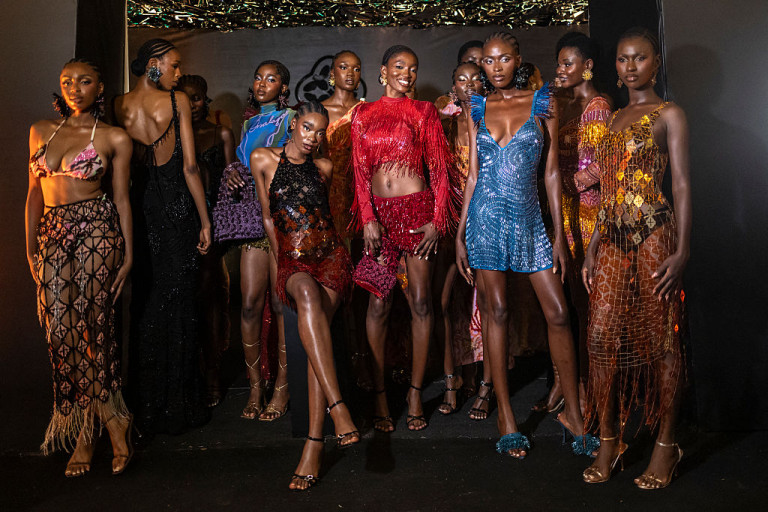
The collection that opened Lagos Fashion Week drew heavily from traditional Nigerian textiles and practices. Onalaja, who comes from mixed Edo and Yoruba heritage in a country with hundreds of ethnic groups, focused particularly on adire — a traditional Yoruba indigo fabric that has been prized for its craftsmanship for centuries.
But she didn't just reproduce traditional patterns. Instead, she "reimagined" the storytelling behind adire, bringing it to life with three-dimensional surfaces that transformed flat textile traditions into sculptural garments.
The beaded and sequined dresses that opened the show evoked traditional facial scarification — decorative body modifications that have historically marked ethnic identity and rites of passage in some Nigerian communities. By translating these cultural markers onto clothing, Onalaja found a way to honor tradition while making it accessible to modern wearers.
A Star-Studded Evening in Lagos
The show stretched into the warm Lagos evening at the Federal Palace Hotel, one of the city's most prestigious venues. The guest list read like a who's who of African fashion and entertainment.
Beyond Ciara, attendees included Reni Folawiyo, a prominent Nigerian designer known for her "Afro-lux" aesthetic, and actress Somkele Iyamah-Idhalama, a beloved figure in Nollywood (Nigeria's film industry).
Ciara's decision to attend the Lagos show — rather than waiting for Onalaja to come to her in Los Angeles — speaks volumes about how the fashion world is changing. African fashion capitals are now destinations where international celebrities travel, not just sources of occasional interesting pieces.
African Fashion's Global Breakthrough
Onalaja's success is part of a larger trend: African design is having a major moment on the world stage.
At the Met Gala in May — fashion's most exclusive and prestigious event — soul legend Diana Ross wore a white gown with an 18-foot train designed by Nigerian designer Ugo Mozie. Afrobeats superstars Tems, Burna Boy, and Ayra Starr all attended as well, dressed by British-Ghanaian designer Ozwald Boateng.
These aren't isolated incidents. Major retailers like Saks, Revolve, and Zalando now stock African designers. Fashion publications like Vogue regularly feature African talent. And Lagos Fashion Week has grown from a small industry gathering into Africa's largest fashion event, recognized as a finalist for the Earthshot Prize 2025 for its sustainability efforts.
The international recognition is meaningful, Onalaja acknowledged, calling it "a nice endorsement." But she's clear about where her priorities lie: "The focus remains on Nigeria."
From London and Rome to Lagos
Onalaja's path to fashion success started with serious training. She studied fashion design at the prestigious Istituto Marangoni in London, where she was named best student of the year — an achievement that earned her a scholarship for a Master's degree in womenswear.
She later studied 3D pattern cutting in Rome and worked with renowned designers including Christopher Kane and Giles Deacon, absorbing technical skills from European fashion capitals.
But rather than staying in Europe or relocating to New York, she founded her namesake label in 2014 with a clear mission: to celebrate the female form through a fusion of art and fashion, tradition and modernity, craftsmanship and storytelling.
Her company is based in London, though she has expressed a strong desire to move production to Nigeria. "I've always wanted to make our production local, so that the fashion community around the world finds it beneficial to produce in Nigeria like they do in India and China," she explained.
Financial challenges have made that difficult so far, but it remains a goal as the brand grows. Onalaja will celebrate its 11th anniversary in 2025, marking more than a decade of sustained growth.
Interestingly, Onalaja also serves as Managing Director of PHC Aviation Group Nigeria, balancing fashion design with a career in aviation — proof that creative entrepreneurs often juggle multiple passions.
What Lagos Fashion Week Means
Lagos Fashion Week, now in its 15th year, runs through Sunday in Nigeria's largest city. While fashion weeks happen across Africa — from Dakar to Johannesburg — Lagos is considered the continent's biggest fashion gathering.
The 2025 edition carries the theme "In Full Bloom," celebrating both the event's 15-year milestone and African fashion's emergence on the global stage. Beyond runway shows, the week includes workshops, panel discussions, and exhibitions focused on sustainability, business opportunities, and cultural creativity.
The event has spotlighted thousands of designers over its history and has played a crucial role in nurturing talent. Notable success stories include Bubu Ogisi of IAMISIGO, who received the Zalando Visionary Award, and Yayra Agbofah, who earned the H&M Foundation Global Change Award — both designers were nurtured through Lagos Fashion Week's incubator program.
This year's event is sponsored by major brands including Heineken and supported by financial institutions, demonstrating serious corporate interest in Africa's fashion industry.
The Sustainability Angle
Beyond glamour and celebrity, Lagos Fashion Week is pushing important conversations about sustainability. The event earned recognition as a finalist for the Earthshot Prize 2025 — a prestigious environmental award backed by Prince William — for its work promoting circular fashion, ethical production, and locally sourced materials.
The 2025 edition features a "Green Access" program for emerging designers focused on sustainability and innovation through African craftsmanship. This year's challenge encourages designers to rethink textile waste as both raw material and creative opportunity.
Designers to watch include Hertunba, led by Florentina Agu, who works with upcycled fabrics and handwoven textiles while supporting Nigerian artisans. IAMISIGO, founded by Bubu Ogisi, draws from ancestral techniques and works closely with artisan communities across Africa.
Why This Matters Beyond Fashion
Onalaja's success — and Lagos Fashion Week's growth — represents something bigger than just pretty clothes.
For decades, African designers faced a choice: either exoticize their cultural heritage for Western audiences or minimize it to fit Western aesthetic expectations. Both options required compromising authenticity for commercial viability.
What's changing now is that designers like Onalaja are proving you can be unapologetically yourself — celebrating "chaos," "clashes," and "contrast" — while achieving both critical acclaim and commercial success.
When Jennifer Hudson wears Onalaja to a Hollywood event, when Ciara travels to Lagos for her show, when major retailers stock her designs — it validates the idea that global audiences will embrace authentic cultural expression when it's presented with confidence.
This matters for representation. Young Nigerian girls can now see their culture celebrated on international runways and red carpets, worn by celebrities they admire. That visibility has ripple effects far beyond the fashion industry.
It also matters economically. Fashion is a multi-billion dollar global industry, and Africa's growing presence creates opportunities for designers, manufacturers, craftspeople, models, stylists, and countless others across the continent.
What's Next
As Lagos Fashion Week continues through the weekend, the industry will be watching which designers emerge, what trends develop, and how the conversation around African fashion evolves.
For Onalaja, the journey continues. After eleven years building a brand that now spans continents, dresses Hollywood stars, and champions inclusivity, her message remains remarkably consistent.
She's bringing her heritage — "the chaos and the beautiful, and everything together" — without apology or compromise.
In an industry that has demanded conformity from non-Western designers for generations, that refusal to conform might be her most powerful design choice of all.
And based on Wednesday night's show — with Ciara in attendance, models of all sizes walking confidently, and traditional Nigerian culture transformed into contemporary luxury — it's a choice that's clearly working.
© Copyright Fashion Times 2025. All rights reserved.







